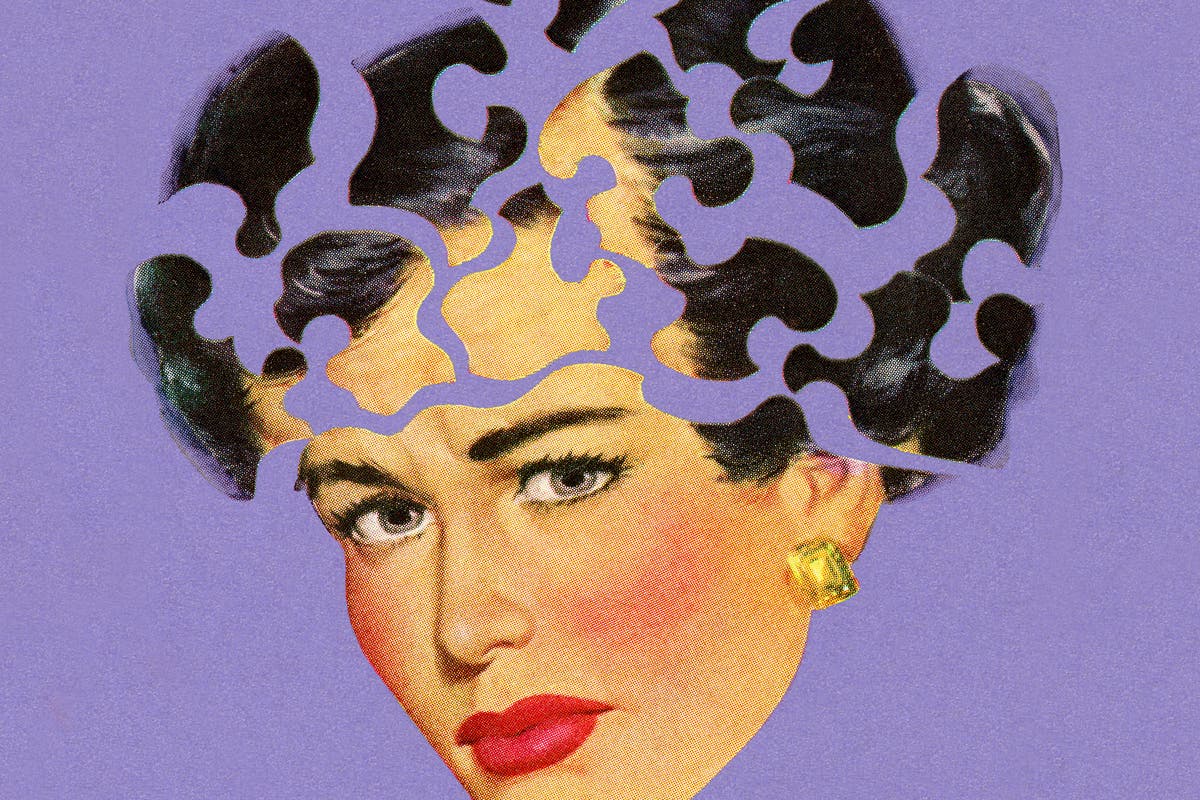myEvery month, there are a few days when I feel so desperately sad that I can barely leave the house. There have been panic attacks, feelings of hopelessness and suicidal thoughts. It is something that has only begun in recent years and, as such, there has been no shortage of things to attribute it to. Work. Family. Money. Relations. Health. Contraception. Owners. Essentially, every type of life problem that can arise for any of us has, at some point, been responsible for my monthly bouts of poor mental health.
It wasn't until last year, when I found myself researching another article on women's health, that I came across PMDD. Premenstrual dysphoric disorder is a severe form of premenstrual syndrome (PMS), which primarily affects mental health. This hormone-based mood disorder, which affects between two and eight women in 100, can cause a variety of emotional and behavioral symptoms similar to PMS, but much, much worse. They range from fatigue, forgetfulness and irritability to anxiety, depression and aggression.
For many, it is a debilitating condition that causes significant monthly disruptions to their psychological and physical well-being, and one study concluded that, if left untreated, women with PMDD could lose three quality-adjusted years of life. But for some it can be fatal: A 2021 study found that women with PMDD are almost seven times more likely to attempt suicide. And yet, to this day very little is known about it.
It was not until 2013 that the PMDD was added to the Diagnostic and Statistical Manual of Mental Disorders, a manual used by health professionals worldwide. In 2019, it was included in the International Classification of Diseases, finally validating PMDD as a legitimate medical diagnosis worldwide. None of this will surprise anyone who has researched medical misogyny and how a long history of dismissing female medical problems has hampered research, diagnosis and development. After all, it wasn't long ago (2002) that some doctors openly questioned whether PMDD was real or not.
Research from 2017 found a genetic basis for the unusual sensitivity that people with PMDD have to estrogen and progesterone.
(Shutterstock / mental mind)
“There is very little research on many aspects of women's health and PMDD is no different,” says Gemma Barry, founder of the Well Woman Project and author of Periods are not meant to hurt. “Women have been labeled with hysteria for many hundreds of years, which has led to the downplaying of many symptoms they experience with their periods and hormones. Our bodies are seen as too complex, with too many variables due to our cycle to try. So almost all studies are done in male mice/rats and then in male humans.”
On average, it takes about 12 years to get a diagnosis of PMDD. The delay is partly due to a paucity of research, which will inevitably have been compounded by the fact that the medical world appears to have only recently legitimized the disease. “PMDD covers a spectrum of symptoms that can make it difficult to diagnose and connect with menstruation,” says Narendra Pisal, consultant gynecologist at London Gynecology. “Many women notice these symptoms, but it can take some time, sometimes years, before the association is made. Mood disorders, such as major depression and bipolar illness, can also worsen during the premenstrual period and can mimic PMDD and make diagnosis difficult.”
“I first went to my GP when I was 11, just after my period started, because I had been having episodes of extreme dizziness and nausea,” says Hannah, 25. “I wasn't diagnosed at the time, but the doctor told me it was hormonal and to keep an eye on it. About a year later, the emotional symptoms hit, occurring the week before my period and alternating between heart attack levels of anxiety and clinical levels of depression. The fatigue is also terrible: I could sleep for 12 hours and still wake up feeling like I've been hit in the head.”
It wasn't until Hannah was 20 that she began researching PMDD. She has not yet been diagnosed. “Last month, I had three days in a row where I needed constant reassurance from my partner that he wasn't going to leave me, and he doesn't think I'm 'trying too hard' or 'getting carried away,'” she says. . “My mood ranged between feeling completely numb, not wanting to get out of bed, and sobbing hysterically. Then two days after my period, as usual, I felt absolutely fine again and I have to apologize to everyone I ignored or criticized.”
I have not yet been diagnosed with PMDD; Conversation is ongoing with my GP. One of the things that makes it so difficult to determine is that PMDD can mimic premenstrual syndrome and, because of the combinations between the symptoms and other mood disorders, it is difficult to know what is really happening in the mind and body. body. It also manifests differently for different people. The best tool at your disposal is time.
The fatigue is also terrible: I could sleep for 12 hours and still wake up feeling like I'd been hit in the head.
Ana, 25 years old.
“Keeping a diary of symptoms and correlating it with the menstrual cycle is key,” says Pisal. “There are also well-validated scales for recording premenstrual symptoms, such as the Premenstrual Experiences Calendar. Contacting your GP with this information will help you arrive at the possible diagnosis and make the appropriate referral.”
While PMDD is definitely a hormonal condition, it is still not known exactly what causes it. Having a family history of mood disorders may contribute. “Genetic traits and biological factors for how hormones are processed in the brain have been suggested, but more research is needed,” adds Barry. “There are also theories that there could be links to childhood trauma, and those who have suffered postpartum depression could be more common.”
Pisal points to research published in 2017, which found a genetic basis for the unusual sensitivity that people with PMDD have to estrogen and progesterone. “But as you can see, this is all quite recent and the lack of consensus and knowledge creates problems of misdiagnosis,” she adds.
Maria, 45, was diagnosed six months ago after decades of battling symptoms. “I thought she was losing her mind,” she says. “She was having suicidal thoughts, really horrible ones, where she almost heard a voice saying that I should kill myself. She was dealing with severe anger attacks that would come on suddenly for no real reason and lead to a terrible outbreak of arguments with my husband and children. He was also completely neurotic and paranoid and read too much into what people said or did. He would believe they wanted to get me.”
For me, the symptoms mostly correspond to depression: fatigue, low mood, and suicidal ideation. However, like Hannah, shortly after I start my period, these feelings disappear. At least for another month. “Both personal and professional relationships can be compromised for people with PMDD,” says Barry. “Along with the combined feelings of shame and guilt about how the PMDD patient feels about their behavior, it can also cause them to fear this impending doom each month, which then begins to affect and ruin the 'good' parts of their cycle. “It can make PMDD sufferers feel quite helpless, being controlled by something that feels uncontrollable.”
So what can be done? Unfortunately, that is a question that is still being investigated. “The nature of PMDD means that sufferers often feel like their emotions are out of their control, so it can be helpful to think about lifestyle factors and self-care methods that are within our control,” she advises. Councilor Georgina Sturmer. , who treats several clients with PMDD. “This could involve exercise, nutrition, good quality sleep and also finding emotional regulation methods that help manage our feelings.”
Reducing other stressors can also help, such as avoiding caffeine, sugar, smoking, and alcohol. Alternatively, some doctors may suggest taking the birth control pill, which balances hormone levels by blocking ovulation. “For severe mood-related symptoms, your doctor may suggest SSRI (selective serotonin reuptake inhibitor) medications, which also work as antidepressants,” adds Pisal. “Taking vitamin B6 pyridoxine and evening primrose oil tablets (both available without a prescription) during the two-week premenstrual window may also be helpful.”
For Hannah, treatment is about taking care of herself, at least until she receives an official diagnosis from her doctor. “I don't think there is a silver bullet for controlling PMDD,” she says. “But I always try to put both feet on the ground and do something for myself, whether it's a bath, lifting weights, having a good coffee or even just going shopping.”
Unlike other mental health conditions, PMDD at least leaves you with the knowledge that what you feel and think is fleeting. “There really is a reassurance that everything that's happening is temporary,” Hannah says. “For me the symptoms last a maximum of a week. I can feel very, very depressed. But it is a comfort to know that I will get out of this.”












